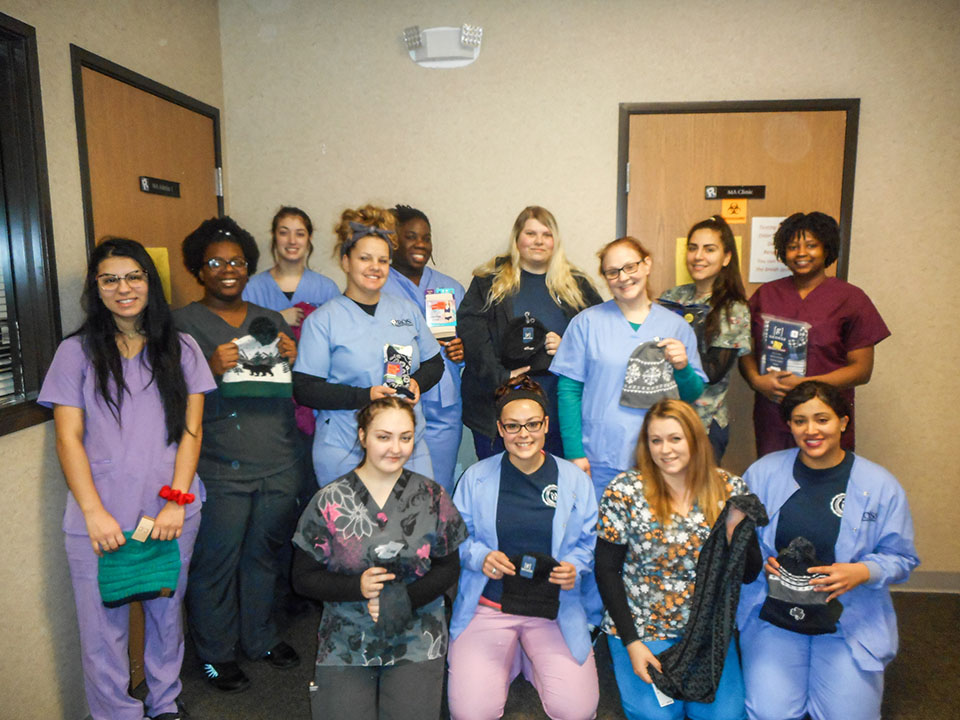In the United States alone, it is estimated that more than half a million people go homeless on a single night. Approximately 65 percent are in homeless shelters, and the other 35 percent—just under 200,000 people—are unsheltered on the streets.¹ In response to this issue, communities across the country have implemented a variety of housing and service programs, including emergency shelters, transitional housing, and permanent supportive housing.²
Ross Medical Education Center held a drive to benefit Lafayette Transitional Housing Center (LTHC). The local organization helps individuals, families, and veterans end their homelessness by getting them connected with a sustainable housing solution. It also strives to educate the community about homelessness; in particular, how it affects people and what can be done about it. Ross’ Lafayette campus held the month-long drive to gather wishlist items that were in short supply. Students were also given the option of donating $1 toward purchasing items on the wishlist. Each $1 donation earned the students a ticket for a drawing at the end of the month.
Each individual who comes to LTHC has a unique situation, so the organization offers a variety of services. Some of the services include a day shelter, a crisis shelter, free meals, a place to do laundry, lockers, and bathrooms. Additionally, case managers, employment specialists, community health workers, and housing specialists are readily available to work with each client on whatever their needs are and to connect them to a housing solution.
To help people get into housing, LTHC has something called tenant education. When a person is within 60 days from being able to get into housing, they start working with a housing coordinator. They’re taught basic life skills, as well as how to deal with their landlords and how to keep up with the responsibilities of their new housing. The class is created with the intention of making their transition back into society an easier and smoother one.
Jennifer Shook, the Chief Development Officer of LTHC, interacts with many of the individuals who come in for help. In doing so, she’s had the opportunity to hear their stories and see how the organization’s services have helped change their lives. She stated, “We see this organization as life-changing. When you’re experiencing homelessness, you have no place to live. No place for your stuff. You don’t even know where your next meal is going to come from. So we work to provide all of those resources to folks that are experiencing homelessness. Just having those things in place makes a huge difference.”
She continued, “We like to think of ourselves as a no judgment zone. It doesn’t matter to us how you ended up in the situation that you’re currently in. The most important thing is that you’re here and we have services available that can help you get back on your feet. Just the other week I had a woman stop by and she made a large cash donation. She was actually a client of ours about a year ago and we helped her get back on her feet. We got her into housing, she got a job soon after, and she wanted to pay it forward by helping someone who is in a similar situation as she was in.”
Jennifer’s job brings her an enormous amount of satisfaction and fulfillment. She truly feels like the work she does has a significant impact on her community. “Everyday I see people who society thinks of as the least of us. Often the stigma that’s associated with homelessness gets topped with either mental or physical health, poverty, or substance use. Part of what we’re doing through our work is we’re trying to get rid of those negative stereotypes. I firmly believe that all of our people are equal. Therefore, they all deserve to be treated with respect and dignity, as well as given the opportunity to have some different options in life. I’m really grateful to be part of something like that,” she stated.
There are many ways to get involved in helping to reduce homelessness. One of those ways is to become a volunteer. Currently, there are limited volunteering opportunities at LTHC, but there are opportunities for people to help in the kitchen, either by serving meals, preparing food, or handling silverware. Another way is to hold drives and donate to the organization. On any given day, LTHC has approximately 300 people in their program, so they go through a lot of stuff, whether that’s undergarments, deodorant, toothpaste, or cereal. Financial donations to LTHC and other organizations like it are always useful in the fight against homelessness.
By the end of the drive, two large boxes of needed items were filled by the staff and students at the Lafayette campus. The housing center was thrilled to have received so many blessings for the local homeless population and thanked Ross staff and students for their generosity and donations. Oftentimes, homeless service systems do not have enough resources to fully meet the needs of everyone experiencing homelessness, so finding the best way to allocate their funds and resources can sometimes be tricky. Jennifer stated, “We know that there are gaps in our community, and one of those gaps is that there’s just not enough housing for folks to be able to afford. So we’re always looking for opportunities to expand supportive housing, and we appreciate any help that we can get.”
For more information on LTHC, please visit https://lthc.net/.
¹ https://www.whitehouse.gov/wp-content/uploads/2019/09/The-State-of-Homelessness-in-America.pdf
